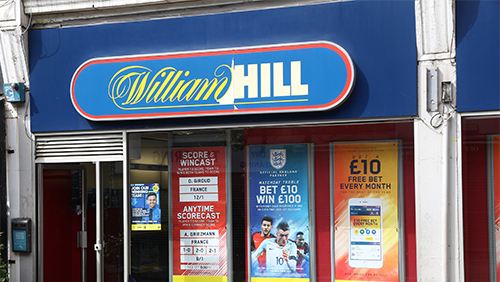There are plenty of reasons to buy William Hill, the newest one being newly-struck deal with CBS on U.S. sporstbook. It adds on to the pile of reasons, but not because it will lead to quick sportsbook gains in the United States specifically. If that is your expectations, you’re buying for the wrong reason. Buying for the wrong reasons isn’t such a bad thing, unless it leads to the flipside of buying for the wrong reason, which of course is selling for the wrong reason. Buyers of this deal should not expect William Hill’s U.S. numbers to jump significantly any time soon. Consider it just another tool that the company now has in its versatile belt.
 Remember the ghost of the once-promising cannabis industry upon legalization, which is now in the doldrums indefinitely because lawmakers just can’t control themselves in their tax greediness. Taxes and regulations have made it virtually impossible for the legal cannabis industry to compete with black market operators. For sportsbook and gaming the situation is different obviously, since black market bookies can’t thrive like black market cannabis operators. But taxes and regulations can certainly kill a nascent sportsbook industry by making it unprofitable to operate.
Remember the ghost of the once-promising cannabis industry upon legalization, which is now in the doldrums indefinitely because lawmakers just can’t control themselves in their tax greediness. Taxes and regulations have made it virtually impossible for the legal cannabis industry to compete with black market operators. For sportsbook and gaming the situation is different obviously, since black market bookies can’t thrive like black market cannabis operators. But taxes and regulations can certainly kill a nascent sportsbook industry by making it unprofitable to operate.
Hill has gotten clobbered in the United Kingdom for nearly 7 years now on the back of a spectacular and retrospectively overbought rally out of the financial crisis, followed by relentless regulatory attacks from the U.K. political class. If a small-government, libertarian-leaning Boris Johnson/Dominic Cummings administration can’t stop the regulatory tide against the U.K. gaming industry, then a best case scenario reelected Trump Administration won’t stop it in the U.S., either. Certainly, a Sanders or Buttigieg Administration will not be nice to a nascent budding betting sector in the “Land of the Free”. Washington is starving for revenue and scapegoats, as are all state governments of the biggest betting markets that are going to be established across the Atlantic over time.
That does not mean that U.S. deals are irrelevant. They are important, essential, and bullish, but more for slow-burn reasons that will only pay off over the long term. Brand recognition and customer acquisition now will go a long way for when the U.S. market is truly ready to grow. That may not be for another 5-10 years or even longer, depending on the timing of the next bust, which will be blamed on irresponsible gambling firms invading U.S. shores and corrupting American culture, among other villains such as “capitalism” and “greed” generally.
If this is the main worry, then why by William Hill at all? Because we’ve already seen how it can perform in an epic financial crisis. Last time it did phenomenally well, considering the whole world was on the brink of collapse. In 2008, gross gaming revenue climbed 3.5% over 2007. Net revenues were up 3.2%. Operating profit was only down a reasonable 2.8%. Looking at the dry numbers for William Hill that year, you’d never guess that global finance was on the brink of total implosion.
 True, the stock did not perform well at all. Neither did anything else. Top to bottom from October 2007 to November 2008, William Hill lost 78% of its market cap. Sounds horrible, and indeed it is. But consider, over the 6 year period from July 2013 to June 2019, the stock is down almost the same amount. 75% loss in 6 years. It’s probably not going to go down that hard again during the next crisis. Though it really is phenomenal how much damage regulations and legislation can do to a company. This long, slow, frustrating decline has pushed sentiment to about as low as it can go, and it is providing a very stable base for an equally long and steady rebound. With a dividend yield higher than 6%, it’s a no-brainer.
True, the stock did not perform well at all. Neither did anything else. Top to bottom from October 2007 to November 2008, William Hill lost 78% of its market cap. Sounds horrible, and indeed it is. But consider, over the 6 year period from July 2013 to June 2019, the stock is down almost the same amount. 75% loss in 6 years. It’s probably not going to go down that hard again during the next crisis. Though it really is phenomenal how much damage regulations and legislation can do to a company. This long, slow, frustrating decline has pushed sentiment to about as low as it can go, and it is providing a very stable base for an equally long and steady rebound. With a dividend yield higher than 6%, it’s a no-brainer.
Much like someone in his prime who loses a job he needed to move on from anyway, William Hill has been forced to adapt away from retail and towards digital. The £2 maximum spin at FOBTs was certainly painful, but brick and mortar betting shops were not the future of the industry. Now it has to channel resources into becoming a new company, which it is in the process of doing.
Beyond that, William Hill is also much better prepared for a crisis now than it was when 2008 hit. Back then, net debt was modestly high at £1.02B. The latest report pins it at only £308.1M at 100% fixed rates. Plus, Hill belongs in the select group of net creditors within the U.K. gaming industry, joining 888 in this rare and enviable position. For every percentage point that interest rates rise from here, Hill adds £5.5 million to its annual profits. True, that’s all other things being equal, which they won’t be, but this bookie will be in prime position to swoop in on desperation deals as its competitors try to offload assets to save themselves from bankruptcy.
Surely in this current environment of extreme leverage, speculation, and sugar-rush buyouts meant to wow shareholders with oozing fat top lines (but also increasingly obstructed arteries), shareholders have not been impressed with William Hill and have capitulated. They want big headline-grabbing moves and that’s what they’re chasing. None of this careful step-by-step growth strategy while the political class cuts you down at every turn. It may not look it now, but William Hill’s behavior will pay off very well in the coming years, that I am fairly certain of.
The partnership with Eldorado last year could prove especially important in light of the fact that Eldorado is now weighed down with its Caesars acquisition. That buyout is going to put Eldorado in a dangerous situation in the months and years ahead, but for William Hill it will open up inroads with Caesars without taking on any of the cost.
William Hill is already about breakeven in the U.S. It could see some income over the next few years, but that should only be seen as a nice bonus. If the U.S. market takes off against my expectations, all the better. I hope it does, somehow. Whatever happens with the U.S. though, the stock has a lot of catching up to do once investors realize that a company as safe as William Hill and with a dividend as high as it is, is basically a steal.
